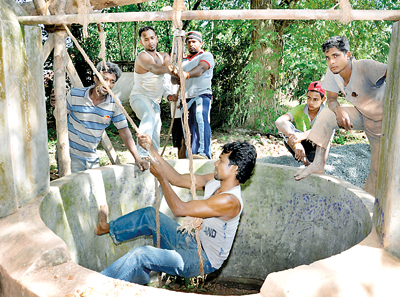News
Drought drives farmers to the wall
As the drought continues to wreak havoc in most parts of the country, driving farmers to the wall, those involved in livestock and cattle breeding, have opted to put up shutters, owing to the lack of water needed for their poultry and animals.
Livestock farmers in Kuliyapitiya- easily the country’s single largest district that produces poultry and related farm products, are reeling under the drought, with many of them opting to sell off their stocks at rock bottom prices, to break even.
Ajith Marasinghe who operates a reasonably sized poultry yard, along with several pigs, at Havana in the Dumalasooriya police area, has sold off almost 80% of his birds and animals, at nearly half the normal price, as the water source on his farm has reduced to a trickle.

Ajith Marasinghe points to an empty chicken coop- Pix by Susantha Liayanawatte
It is not only the water problem that is troubling Mr. Marasinghe, but also the scarcity of wholesale buyers who say that their stocks are full, because many farmers are selling off, owing to the same problem and at the same time.
“It was only the other day that I sold off several heads of pigs at half the normal price, and it was the same with the poultry. Unlike the chicken coops, the piggeries have to be washed on a daily basis, owing to the bad odour, which requires a lot of water for this purpose”, Mr. Marasinghe said.
He added that some 800 litres of water are needed for 1,000 birds each day. So, with this severe drought, this is no longer possible, and the only option left is to sell off the stocks at whatever price offered.
There has never been a similar situation before, because this is a palm growing belt in the country, where there is abundant ground water, but is not the case this time, he explained.
His worries were shared by fellow villager Sumith Nandana is down to a few chickens, as the rest have already been sold out at half the average price.“I work the farm with the assistance of my wife- Pushpa Geethanjali, because we cannot afford hired hands, and things are really rough at the moment, with the drought making matters even worse.”
“Even the irrigation tank (Sanasgara Weva) located alongside my farm, has totally dried up, and the only source of water is from the domestic well, while here too, the level has dropped dangerously”, Mr. Nandana said.
“Many years ago, water was collected from the tank and transported to drought-hit areas in the deep south such as Hambantota and beyond,” his wife Geethanjalai added.

Manjula and his team go down the wells in search of water
56-year-old K.P. Kamala operates the village bakery, but these days she is out of business, owing to the lack of water.
“This is the first time in nearly two decades that we had to shut down the bakery, owing to lack of water,” she said. Like many others in the village, Kamala now depends on a well located in the local school, for their water.
While thousands are affected by the drought, the situation has however, provided dividends to a few individuals such as Manjula Hemachandra and his team.
This team is currently engaged in descending into used wells that have gone dry and dig deeper till they reach the water bearing strata. A costly exercise for the owner.
“During the past eight months, we have handled over 150 wells in the area, and our rates depend on the depth of the well that has to be sunk,” Mr. Hemachandra said.He added that for the first three feet, a fee of something like Rs 7500 is charged.
“This fee will increase according to the depth that has to be dug up, thereafter, which could even go up to Rs 40,000”, he said.
Follow @timesonlinelk
comments powered by Disqus


















